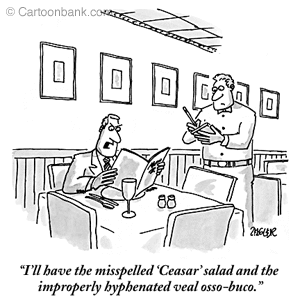Voracious or veracious readers? 20 words not to confuse (7-8)
 I’ve seen a few profiles on Twitter of people who call themselves “veracious readers“. Presumably they mean “voracious readers“. If so, their self-styled title is deeply ironic: even if they read a lot, they cannot be very attentive to the spelling of their reading matter.
I’ve seen a few profiles on Twitter of people who call themselves “veracious readers“. Presumably they mean “voracious readers“. If so, their self-styled title is deeply ironic: even if they read a lot, they cannot be very attentive to the spelling of their reading matter.
Voracious refers to people who eat a lot, and then, as a metaphor, to people who engage in an activity with great gusto and enthusiasm.  At several removes, it’s related to the verb devour, since both derive from Latin vorāre.
At several removes, it’s related to the verb devour, since both derive from Latin vorāre.
Veracious, in contrast, is a really rather rare word, meaning “truthful”, e.g. a veracious witness to great and grave events. So, a “veracious reader” would be a truthful one, though I doubt that is the claim people describing themselves as such are making. Like voracious, it too derives ultimately from Latin, from the word for “true”, vērus, which has given us words such as verify, verity, and the vera of Aloe vera.
Veracious is also used by mistake in phrases such as *veracious appetite instead of the correct voracious appetite.
Of course, veracious may be just a homophone typo for voracious. What I mean is that it is fatally easy to have two words in your mental lexicon that sound exactly the same, and to key one instead of the other, such as “two” for “too“. You know the difference, but when you type with only half a mind on what you’re doing, the wrong one takes over.
In case you’re not convinced that the two words sound the same, here is the phonetic spelling of voracious /vəˈreɪʃəs/, and here it is for veracious: /vəˈreɪʃəs/. Identical. The villain of the piece is that tricksy little symbol /ə/, which occurs in the first and last syllables. It represents the “uh” sound known as a “schwa“, which is responsible for a huge number of spelling mistakes in English.
Filed under: Advice for writers, Confusable words, Grammar, Meaning of words, Spelling, Writing Skills Tagged: 20 confusable words






